#the oscar wilde biography
Text
Starting to realise just how much Matthew Fairchild's character resembles Oscar Wilde and even his early life from my reading of this biography. This feels like no accident because there are far too many coincidences, from appearance to mannerisms and middle child syndrome.
Tag list for my reading (as always, feel free to ask not to be tagged, and ask to be tagged if you have not been and wish to be): @alastairstom @thevagabondexpress @faithfromanewperspective
8 notes
·
View notes
Photo

.: looking at the stars
#my art#rusty quill gaming#rqg#rqg wilde#rqg oscar wilde#rqg spoilers#i've been reading a biography of irl wilde and i just#i may be conferring/projecting feelings#but i just want to see him being happy#i have a lot of Emotions
41 notes
·
View notes
Text
“Ok so the other bookshelf hasn’t arrived yet but why don’t I start organising my books, it will be a fun activity and useful!”
What nobody tells you about said fun activity is that you have to make Choices about how to organise and it’s all very confusing
#I run into this problem EVERY DAMN TIME and I still hate it#I like my history books arranged a certain way so that tends to fuck up the Dewey Decimal or any other system I attempt to impose#Ok so for example what to do with primary historical sources like chronicles and collections of letters#Do I put them with the mediaeval literature section (some of which also functions as a primary historical source- i.e. the Brus)#Or do I put them with my history books (ordered by time period and country)#Or do I put them in their own tiny little category of their own- an extremely confusing and apparently irrational category#Or biographies of authors of which I only have two or three#Do I put them with my other history books or next to the literary works they wrote or on their own little section again#But since I only own maybe three it would be a weird little section just Aphra Behn James Herriot and Robert Henryson by themselves#And then what on earth do I do with C.S. Lewis' Allegory of Love#It's technically literary criticism but I don't own many books in that vein#Never mind the question of whether I should separate novels poetry and plays even if it breaks up an author's output#I don't really want to have to look for Violet Jacob or Oscar Wilde in two or three different places#And then sometimes a book doesn't fall into either of those three categories- should split Nan Shepherd's novels from the Living Mountain?#And what if it's a 'Collected Works' by an author which contains a bunch of non-fiction historical essays as well as a novel?#And don't even get me started on what I'm supposed to do with the Road to Wigan Pier#And then THEN we come to Wodehouse#Do I put Leave it to Psmith with the other Psmith books or in the midst of the Blandings books?#I want all the Psmith series together but what if some hypothetical person new to Wodehouse wandered in#And wanted to start either series at random- would they be confused at the introduction of Blandings too early?#Wouldn't they miss out on some of the best bits that come with knowing Blandings BEFORE Psmith?#I don't know who this hypothetical person is by the way#Nobody's wandering into my house and browsing my bookshelves except me so I don't know who I'm curating this for#I suppose in the back of my mind I always thought I would have kids who would one day be pulling randomly at the family bookshelves#And so that's why I've saved some of the fiction books but I'm not likely to have or even want children so what is the point#I'm not even the kind of person who regularly rereads my childhood favourites but somehow I can't bring myself to throw the kids' books out#It's an immense waste of space and a bit pretentious to have lots of books that nobody else will ever read#Honestly I'd have been happier running a public library or a bookshop I think or even having a flatmate to share books with#Ah well if this is a problem at least it's quite a nice one to have; first world problems only this evening I'll count my blessings#Earth & Stone
8 notes
·
View notes
Text
the amount that I want to be showrunner for a Dickinson-style TV show about Bram Stoker cannot be fully stated
7 notes
·
View notes
Text
BOOK REVIEW: Dancing with Salome: Courting the Uncanny with Oscar Wilde & Friends by Nina Antonia.

A book review by me of Nina Antonia's thought-provoking book of essays revolving around Oscar Wilde, Lord Alfred Douglas, The Picture of Dorian Gray, and the darker elements of the Decadent era - perfect!
Read my review here: https://johnhopperreviews.blogspot.com/
13 notes
·
View notes
Text
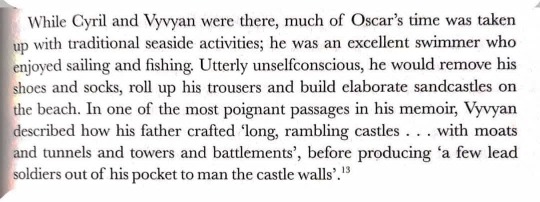
From Eleanor Fitzsimons' Wilde's Women
#something about the image of Oscar Wilde building sandcastles for his sons just...#brings a smile to my face#wildeana#oscar wilde#i'll be done with these biographies soon#i promise!!#eng-lit
2 notes
·
View notes
Text
Oscar Wilde: A Life
Matthew Sturgis
Publisher: Knopf
Genre: biography
Year: 2021
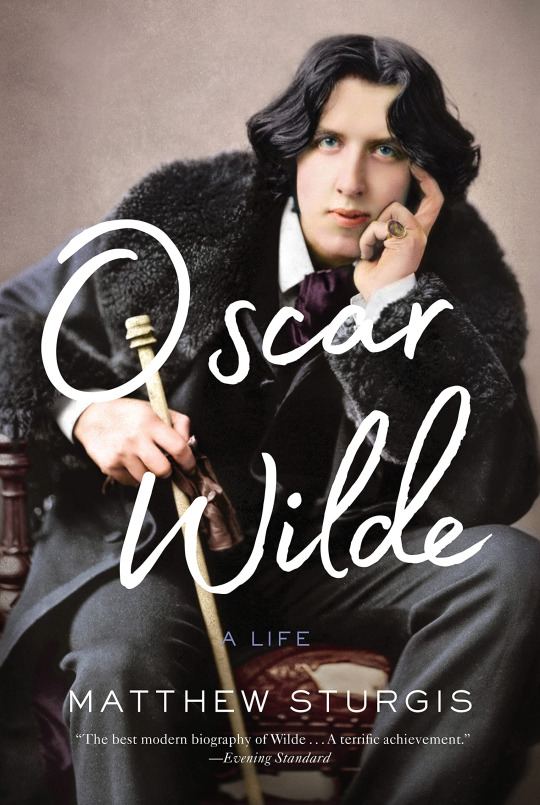
I just finished Oscar Wilde: A Life by Matthew Sturgis and it sure was a doozy. I had borrowed the audiobook from Libby and it's 34 hours long. It took me over a month and multiple borrows to finish.
Sturgis' work claims to be the most comprehensive biography of Oscar Wilde, and he's probably right. It was almost too comprehensive. I was drawn to the book by my desire to learn more about queer history, and while I had known peripherally that Oscar Wilde was gay, I didn't know much more about it.
Oscar is such a polarizing figure. I would have found him insufferable if I had met him, with his witticisms and opinions about life. Yet at the same time, he was an early feminist, raised by a talented mother, he valued the opinions of his female friends, and admired the work of female artists with the same or even more dedication than he gave his male contemporaries. I think he would be considered gay in today's lexicon, because although he had a wife, Constance, and two sons with her, his romantic and sexual excitements were solely with men.
What I didn't know that Wilde's long-time lover, Alfred "Bosie" Douglas, son of the Marquess of Queensbury is the one who led to his downfall. Bosie, through his letters to and from Wilde is revealed to be incredibly selfish, childish, and angry. He is the one who insisted Wilde sue Bosie's own father for "libelous" claims about their relationship, to which Sir Douglas had intercepted one of Wilde's letters to be read aloud in court, leading to Wilde's prison sentence. Bosie was a continuous figure in Wilde's life until Wilde's death in 1899, when Douglas apparently renounced his homosexuality, turned Catholic (ew) and married a woman, even though by all accounts he was much worse and more promiscuous than Wilde himself when it came to securing the attentions of young men.
But the unintentional consequence of me reading this book is it reaffirming my leftist principles and really hit home for me the extreme class system of old-money Europe. Wilde, born to the lower gentry, was able to secure connections, and was given so many opportunities. He himself was poor, and relied off his wife's inheritance, even after their separation, but was allowed to stay in hotels and chalets for weeks or months on credit, which he may or may not eventually pay, occasionally writing, but more often living his life to the fullest extent. The man lived his life in luxury and didn't do much to earn it besides occasionally writing plays and submitting book reviews to newspapers. What I wouldn't give to live that life lol, just being artistic, gay and drunk all the time, with random lectures about being a feminist to insufferable men around me. Yeah, but this book accidentally has really class-oriented themes.
That's not to say Wilde was a "good" person, per se. He was vain, selfish, and insufferable, but worst of all, he did go through a phase of having a taste for the young men that was bordering on creepy. Like in his 30's going after late teens.
Overall, I learned a lot, but it was also just an overload of information. But then again it's described as "the most comprehensive Wilde biography" so I guess I got what I paid for, so to speak.
storygraph | bookshop.org | local houston
★★★ long-winded informative stars
#book review#nonfiction#oscar wilde#matthew sturgis#biography#knopf pub#good but not great#lgbt#three stars#2021#featured#queer
2 notes
·
View notes
Text
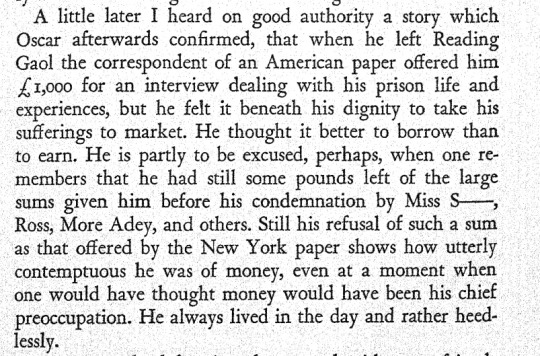
Oscar Wilde: his life & confessions by Frank Harris
1 note
·
View note
Text
Oscar Wilde was an exceptionally versatile writer who produced a wide range of literary works, including but not limited to criticism, essays, reviews, novels, poetry, short stories, plays, and even children's fiction. His wit and skillful penmanship were evident in all of his written creations.
1 note
·
View note
Text
like i know we all hate popular pop music made by british men but if you only gave this video a chance
#all i've done all day is read oscar wilde biography and listen to this#and i'm like wow what if oscar wilde could have gone to a robbie williams concert#like realistically he probably would have had a good time!
9 notes
·
View notes
Text
Finding similarities between Oscar Wilde and Thomas Lightwood now. Here's a quote: 'He was remembered as an 'ungainly, overgrown, moping, awkward lad' who was 'continually knocking things over... and at whom everybody laughed'.'
Tag list: @alastairstom @faithfromanewperspective @thevagabondexpress
1 note
·
View note
Text
Just me lying in bed all day and binge reading Oscar Wilde's biography by Frank Harris
#friendship goals are writing a two-volume biography for you infamous friend#he literally said fuck'em and published it anyway#it's said to be an unreliable source but it's a enjoyable read so far#it's the only Oscar biography I have access to so#Oscar Wilde His Life and Confessions#books and reading#oscar wilde#oscar my beloved#me post
0 notes
Photo

218. Wilde - O Primeiro Homem Moderno (Wilde, 1997), dir. Brian Gilbert
#cinema#brian gilbert#stephen fry#uk movies#1990s movies#biography#drama#romance#based on the book by richard ellmann#oscar wilde#novelist#homosexuality#scandal#homophobia#english culture#homoerotic#gay relationship#based on true story#19th century#prison#aristocracy#independent film#lgbt cinema#male objectification#hypocrisy#bafta awards nominee#25th anniversary#cinefilos
1 note
·
View note
Text

Photo ID: a screenshot of a tumblr user’s tags reading: #dracula daily #bram stoker: accidentally write a horror comedy with queer main characters #dracula End ID
———————————————————————
Now I’m not coming after this person or naming them cause it’s not their fault at all but I am begging y’all to understand the queer allegories are not a mistake. They are not a coincidence.
This isn’t a fuddy old timey white man accidentally walking into making an incredibly queer book.
Bram Stoker was most likely a closeted queer man. He started writing Dracula a month after Oscar Wilde’s imprisonment, who was someone he knew personally. He and Walt Whitman wrote very homoerotic letters to each other. It was rumoured he had a massive crush on his boss, Henry Irving, who he wrote a biography on and who he heavily based Dracula’s appearance on (sans the hairy palms and pointy ears lol)
That is the context Dracula was written in. So when Mina and Lucy are galpalling it up, when Lucy’s three weed smoking boyfriends seem very close, when Dracula is jealous and protective of Jonathan and wants to stay up all night talking, please don’t run away with the idea that those are coincidences, or that Stoker was somehow blindly stumbling his way through this.
He knew. It’s on purpose.
6K notes
·
View notes
Text
alkaid: of sincerity, soulmates, and selfless sacrifice
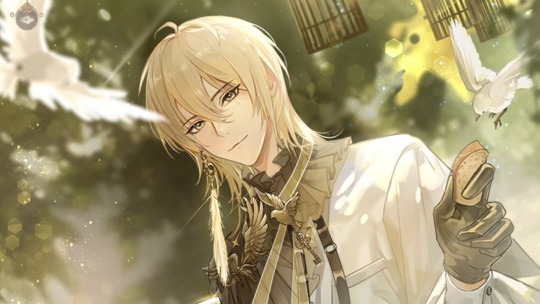
˗ˏˋ ☆ ˎˊ Happy birthday, Alkaid! \(´▽`)/ ˏˋ ☆ ˎˊ-
In honour of this special day, I’ve prepared a present – a short meta post answering the question posed in the LBC discord server, “What made you fall for Alkaid?”
This screenshot pretty much sums it up (mild Godheim spoilers):

Alkaid loves deeply, and this manifests in his unwavering devotion and earnest sincerity. He is a steadfast protector who loves and feels and hurts with every fibre of his being, yet he conceals this intensity with a genial demeanour.
What are Alkaid’s core motivations and character traits? What lies beneath the facade of this heartrendingly complex character? For all that Alkaid is an enigma, he also inadvertently wears his heart on his sleeve, if you know where to look.
[ SPOILERS: broad references to Alkaid’s stories from Godheim, White Day, and Book of Tales. ]
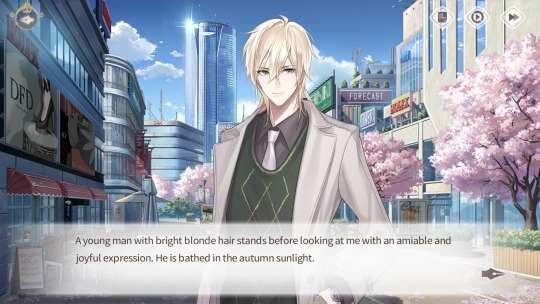
Upon MC’s first encounter with Alkaid in the modern world, my first impression of him was a decently good one, but not particularly impressive or memorable. He’s the generic nice guy, the affable upperclassman who welcomes you to school and helps you settle in comfortably.
Later, we come to realise that this is exactly what he wants others to think. Alkaid intentionally projects the image of an unassuming gentleman, concealing his true emotions underneath an amiable disposition and a pleasant smile. Wearing this persona as his shield, he strives to be likeable, while also fading into the background, unobtrusive and unremarkable. The less attention drawn to himself, the better; there will be fewer chances to slip up, fewer risks of making a mistake. As long as he keeps up appearances, he can play the role of the perfect prince.
Alkaid does not do this to be deliberately duplicitous; in fact, it is much the contrary. His innate kindness and self-effacing consideration for others spur him to accommodate as much as he can, often to the point of self-sacrifice. He hides his true self, in order to please others. He relinquishes what he has, in order to give others what they want. Alkaid puts himself secondary to what others ask of him, not because he thinks of himself as worthless, but because he believes he is worth less.
In the Book of Tales event, Alkaid’s story draws from Oscar Wilde’s The Nightingale and the Rose. It is a tale of a nightingale who sacrifices her blood and her life, in order to create a red rose for the human she loves. In the same way, Alkaid readily pierces himself with thorns so that he can give MC the red rose she needs. Despite the excruciating pain, he does not flinch in the slightest, but he immediately reacts in a panic when MC is hurt by the thorny vines. Alkaid cares for others more than he does himself, yet he does not realise that by valuing himself less and taking all the hurt upon himself, he is inadvertently hurting those who care for him.

In Godheim, Alkaid’s love is also shown through selfless sacrifice. He willingly forsakes himself without a second thought, simply because he loves someone that deeply and thinks that little of himself in comparison. He would rather inflict wounds on himself than risk taking advantage of the person he loves, and he always strives to be kind no matter the cruelty dealt to him. His desire stems from love, and his power coalesces from his wish to protect those who matter to him.
In an effort to keep MC safe, Alkaid pushes himself to the brink, exhausting all his magic and life energy to the point that he nearly dies. One particular route branch has him shouldering the blame on MC's behalf, taking her punishment upon himself so that she doesn't have to. At the end of it all, he even writes a biography to honour Clarence's sacrifice, despite everything the Archmage has done to him. Alkaid is so empathetic that he can see past his sister's death and recognise that MC is an unwilling player in this whole situation, that she doesn't deserve anyone's ire.
Alkaid's heart runs so deep and so kind, yet he never recognises his own goodness, instead fearing the potential for evil within him. Throughout his Godheim route, he refrains from ending anyone's life, even that of his enemies, yet he is willing to commit evil with his own hands if it means he can protect his beloved MC. It is this irony, this multifacetedness to Alkaid that makes him such an intriguing character – even as it makes him fear himself for what he is capable of.
In modern-day Alkaid, this contradiction is reflected in his self-perception. Borrowing the metaphor of the Rose Elf and the Gentleman Agent, Alkaid believes he cannot possibly be the former because he is nowhere near as honest or upright. Instead, he identifies with the latter, because he hides so much of himself in the shadows.
What Alkaid fails to realise, however, is that these characters are not one-dimensional tropes, and neither is he. The Gentleman Agent is shrouded in veils and deceit, but he is also a protector. The Rose Elf is fragile and delicate, but he is also so ardent in his love and commitment. Alkaid is all of these things, because they can coexist without being contradictory. I won’t go into detail about Awakening, since it’s still a relatively new release and the story is best experienced for yourself, but his route there also ties in with this theme.

Alkaid’s worst fears stem from the dual nature he perceives in himself, the capacity for evil that he believes lurks dormant in his heart. He views good and evil as a binary, believing that they exist as a dichotomy within him, and this is exemplified by the black and white imagery he's often depicted with. Referring to his negative emotions and thoughts as his “other side,” Alkaid separates his good, ideal self from the side he believes he must suppress.
Ironically, this demarcation between the parts of him that are acceptable and the parts that are not inevitably exacerbates Alkaid’s fears. The more people like his outward persona, the more he worries that they will scorn his true nature. He believes that other people like him for what he seems to be, but that they will not like him for who he actually is. He is deceitful, dangerous, disappointing, do they not see that? Do they not realise that the true him is not worthy of such praise or adoration?
The answer is no, because Alkaid is far harsher on himself than he deserves. He is human, and he is allowed to be multifaceted, to have different sides to him, to feel emotions that are positive and negative and the full gamut that runs in between. He is not a dichotomous binary, but a complex being that exists beyond good and evil.
This is where MC comes in. She sees Alkaid for who he is – all the sides he does not show others, and all the selves in disparate worlds across space and time. Beyond the idea of soulmates, her connection with him is that of 知己 (zhī jǐ) – to know someone as you know yourself – in how deeply and thoroughly she understands him. She perceives him, down to the depths of his soul, and she says: I love you, still. Not despite his flaws, or regardless of his shortcomings. Rather, it is an acceptance, encompassing every fibre of his being. I love you for everything you are.
There’s a line from Tian Guan Ci Fu (天官赐福; Heaven Official’s Blessings) that resonates with this idea: 对我来说,风光无限的是你,跌落尘埃的也是你。重点是'你',而不是'怎样'的你。”To me, the one basking in infinite glory is you, and the one fallen from grace is also you. What matters is ‘you,’ not the state of you.” Alkaid strives to only show his best sides to others, but MC embraces all his worst sides just as readily. He is terrified that she will leave when she realises he’s not like the person she initially thought she loved, but she stays because she sees all of him and cherishes him through it all. She loves him, because he loves so deeply, and he deserves to be loved in return.
So, happy birthday, Alkaid – you are worthy of the love you receive.
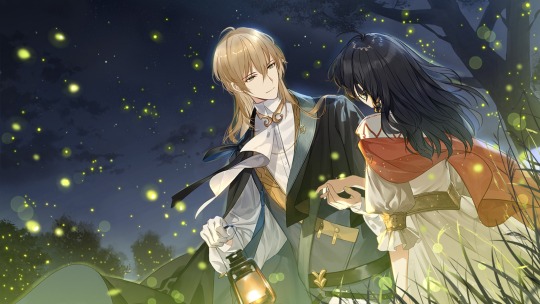
#lovebrush chronicles meta#lovebrush chronicles#for all time#lbc#lbc spoilers#alkaid mcgrath#lovebrush alkaid#godheim alkaid#eden alkaid#modern alkaid#sol's meta musings
65 notes
·
View notes